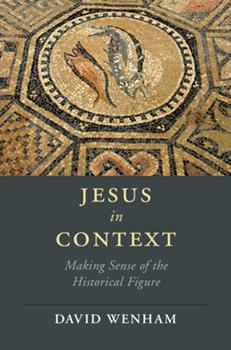Q. In regard to the triumphal entry and the ‘cleansing’ of the temple, I agree with your reading of those actions. They are deliberate and deliberately provocative. I would call them prophetic sign acts. If Jesus had disciples of zealotic tendencies, I would expect they would see these actions as signaling that Jesus was coming to take over and establish himself as king/messiah in Jerusalem. When this not only didn’t happen (see Lk. 24— ‘we had hoped (past tense) he was the one to redeem Israel’) it would have crushed such notions. To me this is the best explanation for what Judas Iscariot did. He had such hopes, and when they were not going to be fulfilled, then he came to the conclusion Jesus was a deceiver about the coming Kingdom and so felt obliged to betray him. Does this make sense to you? What is your view of the actions of Judas during the last week of Jesus life.
A. I completely agree. I assume that Judas faced with the disappointing realization that Jesus was not going to be the conquering Messiah that he had hoped for and that on the contrary Jesus was heading willingly for death decided that he could no longer stick with him. He felt betrayed by Jesus, and so allowed himself to become the betrayer.
Q. The question about whether Jesus was divine is usually not framed in a way that would make sense in Jesus’ Jewish context. As you mention, Jesus did not go around saying ‘Hi I’m God’ for the very good reason that that would mean in his context ‘Hi, I am Yahweh’ and clearly Jesus distinguished himself from Yahweh, his Abba. On the other hand, he was insistent he was Yahweh’s beloved Son, something the Gospel writers also insist on. And so, there was an amplification of what the term ‘God’ meant in light of Jesus own claims as we see in 1 Cor. 8.4-6, and the later reflections of the earliest followers of Jesus on his claims, life, and actions, including his death and resurrection.
I was a little surprised when you dealt with the Olivet discourse that you didn’t mention the way various OT prophets would juxtapose speaking about events on the near horizon with speaking about events on the more distant horizon as Jesus does in Mark 13 where ‘these things’ are said to happen with a generation (40 years) and the events ‘after those days’ are referred to as happening at a non-specific time in the future, particularly when it comes to the timing of Christ’s return as the Son of Man. In short there is an A,B, A’,B’ pattern to Mark 13 with A being the near events. I agree with you that Paul seems to know some of the discourse in Mark 13 and alludes to it, and he knows the thief in the night metaphor as well which implies a coming at a surprising time. In short, we should have exorcised the ghost of Schweitzer a long time ago when it comes to discussing Jesus and his vision of the future. Why do you think the notion of Jesus as a mistaken eschatological prophet keeps surfacing again and again even among scholars?
A. I am sorry to have disappointed you in my discussion of the eschatological discourse. I largely agree with your view of the dual focus of the discourse, as I argued many years ago in article in a Festschrift for Donald Guthrie Christ the Lord. Not that I find it difficult to understand scholars who think Jesus was a mistaken prophet: there are several verses where Jesus does appear to be anticipating an imminent coming of the kingdom, and scholars, including conservative scholars, have struggled with them. One of the most notable scholars on the subject George Beasley-Murray argued that Jesus was mistaken on the matter of timing – he admitted his ignorance on that matter – but Beasley-Murray argued that this was not theologically problematic, since Jesus himself said how he did not know the day or hour. It was simply part of his human limitations, which he himself referred to. Tom Wright takes the view that the coming of the Son of man in the discourse is not the second coming of Christ, as Christians refer to it, but is the vindication of the Son of man which included the resurrection of Jesus but which is best explained in terms of the events of AD 70: God’s judgment on Jerusalem and the vindication of Jesus were manifested in the destruction of Jerusalem, all within a generation. I have favoured your view, though I have found myself moving some way towards Wright’s view: when Jesus came to Jerusalem before his death, he anticipated (1) his own suffering and death at the hands of his opponents who would reject his message, (2) his own vindication and resurrection after ‘three days’, whether this is understood literally or symbolically, (3) judgment and destruction coming on Jerusalem because of the Jews’ rejection of his message, all within a generation, (4) his final glorious vindication as Son of man coming on the clouds, the timing of which was unknown to Jesus himself – like the coming of a thief at night. (I think Paul was familiar both with Jesus’ parable of the thief and also the parable of the wise and foolish virgins, who ‘fell asleep’ when the bridegroom’s coming was delayed, as I have argued in my various studies of Paul and Jesus.)













